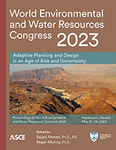Empirical Evidence Shows That Curve Numbers Vary from Event to Event
Publication: World Environmental and Water Resources Congress 2023
ABSTRACT
The Natural Resources Conservation Service’s (NRCS) curve number method is a popular approach for estimating discharges from rainfall data. It makes use of a dimensionless parameter—called the curve number—that is obtained from soil, antecedent moisture, and land use conditions. This parameter is traditionally taken to be a constant watershed characteristic; however, in this paper, the validity of this assumption is questioned by generating event curve numbers from a data set of 1,393 rainfall-runoff events from 61 watersheds in Texas, with each watershed having at least 10 rainfall-runoff events. For a given event, the accumulated precipitation was obtained from the rainfall data, and the accumulated depth of runoff was obtained by dividing the volume of direct runoff by the area of the watershed. From the accumulated precipitation and runoff depth, the curve number was obtained using the NRCS’s curve number method. The standard deviations of the curve numbers for each watershed were calculated, and it was found that 24 watersheds had standard deviations of the calculated curve numbers greater than 10; 35 watersheds, between 5 and 10; and only two watersheds had standard deviations of less than five. Moreover, the maximum, minimum, and average standard deviations considering all watersheds were 18, 4, and 10, respectively. The fact that these values are not small indicates that the curve number is not a constant watershed characteristic; rather, it varies from event to event—although the subject of what standard deviation is considered small may be subject to debate.
Get full access to this chapter
View all available purchase options and get full access to this chapter.
REFERENCES
Ajmal, M., Waseem, M., Kim, D., and Kim, T. W. (2020). A pragmatic slope-adjusted curve number model to reduce uncertainty in predicting flood runoff from steep watersheds. Water, 12(5), 1469.
Boughton, W. C. (1989). A review of the USDA SCS curve number method. Soil Research, 27(3), 511–523.
Caletka, M., Šulc Michalková, M., Karásek, P., and Fučík, P. (2020). Improvement of SCS-CN initial abstraction coefficient in the Czech Republic: A study of five catchments. Water, 12(7), 1964.
Chin, D. A. (2022). Minimum Rainfall for Applying the Curve-Number Method. Journal of Irrigation and Drainage Engineering, 148(8), 06022003.
Hawkins, R. H., Ward, T. J., Woodward, D. E., and Van Mullem, J. A., eds. (2008, November). Curve number hydrology: State of the practice. American Society of Civil Engineers.
Krajewski, A., Sikorska-Senoner, A. E., Hejduk, A., and Hejduk, L. (2020). Variability of the Initial Abstraction Ratio in an urban and an agroforested catchment. Water, 12(2), 415.
Mockus, V. (1957). Use of storm and watershed characteristics in synthetic hydrograph analysis and application. American Geophysical Union, Pacific Southwest Region, Sacramento, CA.
NRCS (Natural Resources Conservation Service). (2007). National Engineering Handbook, Part 630, Chapter 16. U.S. Department of Agriculture, Washington, D.C.
Ponce, V. M., and Hawkins, R. H. (1996). Runoff curve number: Has it reached maturity?. Journal of hydrologic engineering, 1(1), 11–19.
SCS (Soil Conservation Service). (1972). National Engineering Handbook, Section 4, Hydrology. U.S. Department of Agriculture, Washington, D.C.
Soulis, K. X. (2021). Soil conservation service curve number (SCS-CN) Method: Current applications, remaining challenges, and future perspectives. Water, 13(2), 192.
Woodward, D. E., Hawkins, R. H., Jiang, R., Hjelmfelt, A. T., Jr., Van Mullem, J. A., and Quan, Q. D. (2003). Runoff curve number method: Examination of the initial abstraction ratio. In World water & environmental resources congress 2003 (pp. 1–10).
Information & Authors
Information
Published In
History
Published online: May 18, 2023
ASCE Technical Topics:
- Climates
- Engineering fundamentals
- Environmental engineering
- Geomechanics
- Geotechnical engineering
- Hydrologic data
- Hydrologic engineering
- Hydrology
- Mathematics
- Meteorology
- Parameters (statistics)
- Precipitation
- Rainfall
- Rainfall-runoff relationships
- River engineering
- River systems
- Runoff
- Runoff curve number
- Soil mechanics
- Soil properties
- Soil water
- Statistics
- Water and water resources
- Watersheds
Authors
Metrics & Citations
Metrics
Citations
Download citation
If you have the appropriate software installed, you can download article citation data to the citation manager of your choice. Simply select your manager software from the list below and click Download.
